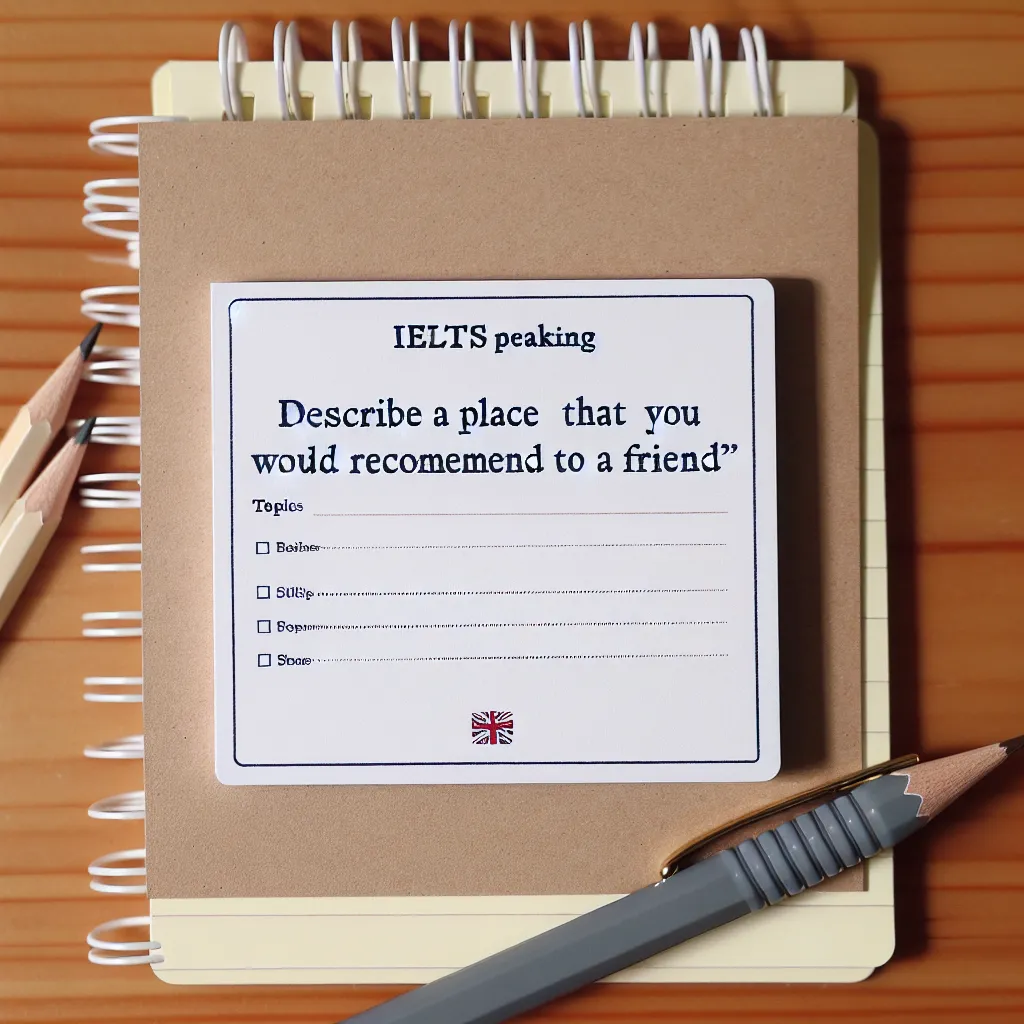Are you preparing for the IELTS Speaking test and wondering how to tackle questions about relaxation spots? In this comprehensive guide, we’ll explore the topic “Describe a place where you go to unwind after a long week” – a common theme in IELTS Speaking examinations. As an experienced IELTS examiner, I’ll provide you with valuable insights, sample answers, and tips to help you excel in your IELTS Speaking test.
 Serene lakeside relaxation spot
Serene lakeside relaxation spot
Understanding the Topic
The ability to describe a place where you relax is crucial for the IELTS Speaking test. This topic has been a recurring theme in past exams and is likely to appear in future tests as well. It allows examiners to assess your vocabulary, fluency, and ability to express personal experiences.
Part 1: Introduction and Interview
In this section, the examiner may ask you general questions about relaxation and unwinding. Here are some possible questions and sample answers:
Q1: Do you find it easy to relax?
Band 6-7 Answer:
Yes, I generally find it quite easy to relax. I have a few go-to activities that help me unwind, like reading a book or taking a walk in the park.
Band 8-9 Answer:
Absolutely, I’ve developed a knack for relaxation over the years. I find that engaging in mindful activities, such as meditation or yoga, significantly enhances my ability to unwind and recharge my batteries.
Q2: What do you usually do to relax?
Band 6-7 Answer:
To relax, I usually listen to music or watch my favorite TV shows. Sometimes, I also enjoy cooking a nice meal for myself.
Band 8-9 Answer:
I have a diverse range of relaxation techniques that I employ. My go-to methods include immersing myself in a good book, practicing mindfulness meditation, or indulging in a long nature walk. I find these activities incredibly effective in helping me decompress and clear my mind.
Part 2: Long Turn (Cue Card)
Here’s a sample cue card related to our topic:
Describe a place where you go to unwind after a long week.
You should say:
- Where this place is
- How often you go there
- What you do there
- And explain why you find it relaxing
Sample Answer (Band 8-9):
The place I’d like to describe is a tranquil lakeside spot about a 30-minute drive from my home. It’s a hidden gem that I stumbled upon a few years ago during a weekend excursion, and it has since become my go-to sanctuary for relaxation.
I make it a point to visit this serene location at least twice a month, especially after particularly hectic weeks. The journey itself is part of the unwinding process, as I drive through picturesque countryside, leaving the hustle and bustle of the city behind.
Once there, I engage in various activities that help me recharge my batteries. I often start by taking a leisurely stroll along the lakshore, breathing in the fresh air and soaking in the natural beauty around me. Sometimes, I’ll find a comfortable spot to sit and read a book or practice mindfulness meditation. On warmer days, I might even take a refreshing dip in the lake.
What makes this place so relaxing is its perfect blend of natural beauty and tranquility. The panoramic views of the lake, surrounded by lush greenery, create a soothing atmosphere that instantly melts away my stress. The absence of city noise and the gentle sounds of nature – like the lapping of waves and chirping of birds – help me disconnect from the outside world and focus on the present moment.
Moreover, this spot offers me a much-needed change of scenery from my daily routine. It’s a place where I can escape the demands of work and social obligations, allowing me to reconnect with myself and gain perspective on life. The therapeutic effect of being in nature, combined with the opportunity for quiet reflection, makes this lakeside retreat an invaluable part of my stress management routine.
Follow-up Questions:
- Do you prefer to unwind alone or with others?
- How has your approach to relaxation changed over the years?
Band 8-9 Sample Answers:
-
While I appreciate the company of others, I find that solitude is key to my relaxation process. Being alone allows me to fully immerse myself in the experience without any distractions or social obligations. It gives me the freedom to introspect and recharge my social batteries, which is especially important after a week filled with interactions.
-
My approach to relaxation has evolved significantly over the years. In my younger days, I often equated relaxation with entertainment, such as watching TV or playing video games. However, as I’ve matured, I’ve come to realize the importance of more mindful and nature-based activities. I’ve found that these methods not only help me relax in the moment but also contribute to my overall well-being and stress resilience in the long term.
Part 3: Two-way Discussion
In this section, the examiner will ask more abstract questions related to relaxation and unwinding. Here are some potential questions and sample answers:
Q1: How do you think the concept of relaxation differs across cultures?
Band 6-7 Answer:
I think relaxation can be quite different in various cultures. Some cultures might prefer active ways of relaxing, like sports, while others might focus more on quiet activities like meditation. It probably depends on the values and traditions of each culture.
Band 8-9 Answer:
The concept of relaxation is undoubtedly influenced by cultural norms and values. In some cultures, particularly in the East, relaxation is often intertwined with spiritual practices like meditation or yoga, emphasizing inner peace and mindfulness. Conversely, Western cultures might lean towards more active forms of relaxation, such as sports or social gatherings. Additionally, the pace of life in different societies can shape perceptions of relaxation. For instance, in cultures with a strong work ethic, relaxation might be viewed as a luxury or even feel guilt-inducing, while in others, it’s seen as an essential part of maintaining well-being. It’s fascinating to observe how these cultural differences manifest in various relaxation techniques and attitudes towards unwinding.
Q2: Do you think technology has changed the way people relax? How?
Band 6-7 Answer:
Yes, I believe technology has definitely changed how people relax. Many people now use their phones or computers to watch movies, play games, or browse social media as a way to unwind. However, this might not always be the best way to truly relax.
Band 8-9 Answer:
Technology has undeniably revolutionized the landscape of relaxation, presenting both opportunities and challenges. On one hand, it has made relaxation more accessible through meditation apps, online yoga classes, and virtual nature experiences, allowing people to unwind at their convenience. However, the omnipresence of digital devices has also blurred the lines between work and leisure, making it increasingly difficult for many to truly disconnect. The constant connectivity and information overload can lead to a paradoxical situation where attempts to relax through technology actually induce stress or anxiety. Moreover, the addictive nature of social media and digital entertainment can sometimes substitute genuine relaxation with mere distraction, potentially impeding the quality of our downtime. As we navigate this digital age, finding a balance between leveraging technology for relaxation and unplugging to connect with ourselves and our surroundings becomes increasingly crucial.
Key Vocabulary and Phrases for High Scores
To elevate your IELTS Speaking performance, incorporate these sophisticated words and phrases into your responses:
-
Sanctuary /ˈsæŋktʃuəri/ (noun): A place of refuge or safety.
Example: “The lakeside has become my sanctuary from the stresses of daily life.” -
Recharge one’s batteries (idiom): To rest and relax in order to regain one’s energy.
Example: “I visit the countryside to recharge my batteries after a hectic work week.” -
Therapeutic /ˌθerəˈpjuːtɪk/ (adjective): Having a good effect on the body or mind; contributing to a sense of well-being.
Example: “I find the sound of waves incredibly therapeutic.” -
Mindfulness /ˈmaɪndfʊlnəs/ (noun): The practice of being aware of your body, mind, and feelings in the present moment.
Example: “Practicing mindfulness helps me stay centered and relaxed.” -
Decompress /ˌdiːkəmˈpres/ (verb): To relax or calm down after a period of stress or excitement.
Example: “I need a few hours to decompress after a challenging day at work.” -
Tranquility /træŋˈkwɪləti/ (noun): The quality or state of being calm and quiet.
Example: “The tranquility of the forest helps me forget about my worries.” -
Introspect /ˌɪntrəˈspekt/ (verb): To examine one’s own thoughts and feelings.
Example: “Solitude gives me the opportunity to introspect and gain clarity.” -
Rejuvenate /rɪˈdʒuːvəneɪt/ (verb): To give new energy or vigor to; revitalize.
Example: “A weekend in nature always rejuvenates my spirit.”
Examiner’s Advice
To achieve a high score in the IELTS Speaking test, particularly when describing a place where you unwind:
- Use varied vocabulary: Incorporate a range of descriptive words and avoid repetition.
- Provide specific details: Don’t just say a place is relaxing; explain why and how it affects you.
- Use complex sentence structures: Mix simple and compound-complex sentences to showcase your language proficiency.
- Show personal reflection: Demonstrate your ability to analyze and express your feelings about the place.
- Practice fluency: Aim for smooth delivery without long pauses or hesitations.
- Maintain coherence: Ensure your ideas flow logically from one point to the next.
- Use idiomatic expressions: Naturally incorporate idioms and colloquial phrases to enhance your speech.
Remember, the key to success in the IELTS Speaking test is not just about what you say, but how you say it. Regular practice and exposure to English will help you develop the confidence and fluency needed to excel in your exam.
For more tips on improving your IELTS Speaking skills, check out our guide on how to describe a place where you like to go on weekends. This will provide you with additional vocabulary and structures that can be applied to various speaking topics.


